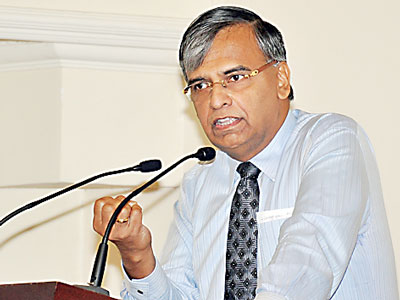Saturday Feb 21, 2026
Saturday Feb 21, 2026
Wednesday, 23 November 2016 01:09 - - {{hitsCtrl.values.hits}}
By Charumini de Silva
Although Government’s revenue collection efforts are challenging and controversial, a top tax expert opined that it would be feasible only with improved administration.
Speaking at the post-Budget seminar organised by National Chamber of Commerce (NCCSL) on Monday Gajma and Co., Tax Consultant and Managing Partner N. R. Gajendran said that there is a lot of expectation from policy makers about this Budget, but a major factor deciding its success would be a streamlined tax administration by the Government.
 “There is no question that the Government needs revenue to ensure fiscal and macroeconomic stability, however not having a fair, simple and efficient tax administration will question its own survival. For all that to take place, we have to see if the tax administration is going to be vicious or virtuous,” he stressed.
“There is no question that the Government needs revenue to ensure fiscal and macroeconomic stability, however not having a fair, simple and efficient tax administration will question its own survival. For all that to take place, we have to see if the tax administration is going to be vicious or virtuous,” he stressed.
Commenting on the new Inland Revenue Act he cautioned that if not implemented properly, it could be a disastrous. “We should be conscious about the new IRD Act. Removing the existing law and brining in a new law could be a disaster. Of course, if there are good things, those need to be brought in, but we shouldn’t do away with the existing structure completely.”
Gajendran was critical about the Financial Transaction Levy (FTL), Notional Tax Credit, SVAT and With-Holding Taxes (WHL).
In terms of the FTL, he said it contradicted the Government strategy to become a competitive investment destination with a better ranking in the Doing Business Index while it would also hurt local entrepreneurship.
“The only good thing is that the Government is saying that the FTL is going to cost the banks. However, if you increase the transaction cost directly or indirectly, it will definitely bring down the overall competitiveness of the country further,” he stressed.
Outlining that there are many unclear areas in the WHT, he suggested that if the Government is keen on implementing the WHT, the agent has to remit the money and in that context tax payer should be given a receipt irrespective of the money that is being remitted to the IRD or not.
He said the removal of notional tax credit would discourage investors investing in Government securities and highlighted that the tax imposed on it was far superior to liquor and tobacco.
Given its peace, stability and strategic location, he said that it was a pity that Sri Lanka couldn’t be a hotspot for foreign direct investments (FDIs) and that the reason for this was that it was inconsistent policies. However, he expressed hope that this would be settled by 2017.
Gajendran commended the reforms taken to streamline the Customs Department while calling on Inland Revenue, Excise, Ceylon Electricity Board and SriLankan Airlines to pull up their socks if Sri Lanka is to achieve middle income status.